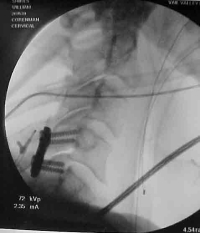Overview of Cervical Spine Fractures & Dislocations
Fractures of the neck are not uncommon but can be devastating. Normally, they occur with a fall onto the head. The momentum causes so much force to the neck that the supporting structures such as the discs and facets fail. Bone can fracture too. The total force can cause cervical spine fractures and dislocations where one vertebra slides too far on another. The spinal cord cannot take twisting, traction, compression and shear forces and develops damage. Nerve injury and paralysis can occur.
Thankfully-paralysis does not occur every time and on many occasions, cervical spine fractures and dislocations can be stabilized and the patient can recover some if not all function. Nondisplaced fractures (those fractures that don’t pull apart at the site of the break) can be treated in a neck collar or CTO (cervico-thoracic orthosis). Fractures that are displaced typically need surgical fixation.
Injuries to the disc and facet can occur with a significant fall or ejection from a car without breaking a bone. Seat belts are vitally important! If there is instability such as if one vertebra misaligns on another or there is too much movement between the segments with motion, surgery is warranted.
Are you suffering from symptoms of a cervical spine fracture?
Would you like to consult with Dr. Corenman about your condition?
You can set up a long distance consultation to discuss your
current X-rays and/or MRIs for a clinical case review.
(Please keep reading below for more information on this condition.)
Most of the time, the surgery is an anterior cervical decompression and fusion- ACDF (see that section for description of the procedure). For more problematic cases involving cervical spine fractures and dislocations, a corpectomy is necessary which is a modification of the ACDF. There are times that a posterior surgery is necessary to stabilize the neck.
If there has been a spinal cord injury, the rehabilitation will initially be based upon surgically stabilizing the spine so no further injury can occur. Then an inpatient rehab facility will be necessary such as Craig Hospital in Denver.
For more information on cervical spine fractures and dislocations, or for additional resources on orthopedic spine surgery, please contact Dr. Donald Corenman, Vail, Aspen, Denver and Grand Junction, Colorado area spine specialist and neck doctor.
Related Content
- Cervical Radiculopathy or Pinched Nerve in the Neck
- Cervical Herniated Disc
- Arthritis of the Neck and Back
- Cervical Deformity
- Cervical Degenerative Kyphosis
- Cervical Degenerative Spondylolisthesis
- Cervical Central Stenosis & Myelopathy
- Chronic Radiculopathy
- Cervical Degenerative Disc Disease
- Cervical Degenerative Facet Disease
- Cervical Spine Instability
- How to Describe Your History and Symptoms of Neck, Shoulder and Arm Pain
- Best Questions to Ask When Interviewing a Spine Surgeon or Neurosurgeon
- When to Have Neck Surgery

